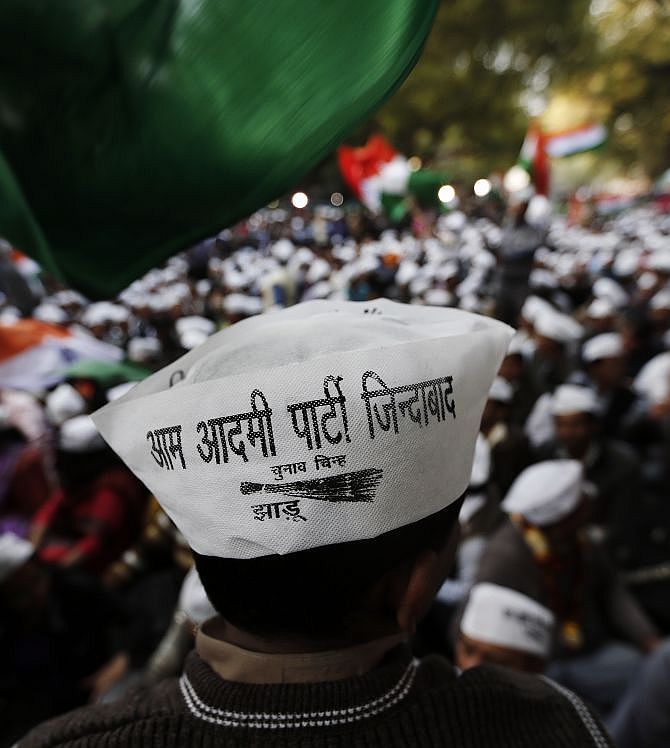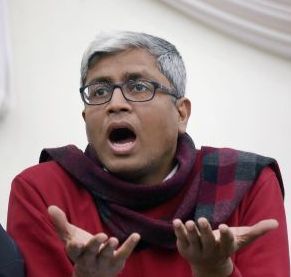 In an exclusive chat with Rediff.com/ Upasana Pandey, AAP leader Ashutosh says the biggest challenge for the party would be to “develop a model for alternate politics, for short term goals such as free water and slashed electricity bills and for long term tasks of creating a safer Delhi for women and ridding the city of corruption in the next five years.”
In an exclusive chat with Rediff.com/ Upasana Pandey, AAP leader Ashutosh says the biggest challenge for the party would be to “develop a model for alternate politics, for short term goals such as free water and slashed electricity bills and for long term tasks of creating a safer Delhi for women and ridding the city of corruption in the next five years.”
AAP's Ashutosh spoke to Rediff.com about the way ahead for the new AAP government in Delhi and his recently launched book, ‘Battle for Change’, a political narrative of 2014 as he transitioned from being a senior journalist to a political activist.
The following are some excerpts from the interview:
What is the biggest challenge for the AAP now?
The biggest challenge for the party would be to develop a model for alternate politics, which means politics which is affordable, clean and honest.
How did the AAP make its transition from an agitator to a political party?
There were many factors. People have fallen in love with the idea of clean politics and the Indian sensibility does not accept negativity which was the main focus of BJP campaign. AAP consciously focused on two core areas: the socio-economic reality of the country and the need to correct the perception of being agitators.
Before and during the general elections, there was a mood of anger in the country, which had seen a spate of scams running into thousands of crores. People really wanted to protest and express their anger. The Anna Hazare Movement gave form to this anger. It is undeniable that the AAP is a product of a mass agitation but we are poised to becoming an organised party.
What are the immediate and long term priorities for the new government?
We will be announcing the reduction of electricity bills by 50 per cent and free water supply soon. The long term goals are creating a safer city for women and above all making Delhi a corruption free city. This has to be built through a system which penalises corruption and act as a deterrent.We are not in a hurry but there will be systematic delivery of all promises.
What is the kind of support you are hoping to get from the centre?
In case of inter-state disputes, we expect that the centre will play a mediator’s role and facilitate speedy resolution. For instance, Haryana may be requested to release water for Delhi, one of the areas where we can expect centre to help. There are also many projects and schemes which would require the centre's go ahead, where we expect timely inputs. We are not assuming the centre will create problems for the Delhi government. We are also not in a confrontational mood and hope we can do some smart politics and manage the relationship with the centre.
Tell us about your new book Mukhote Ki Rajneeti?
This book has a collection of my articles and writing s which appeared in Dainik Hindustan, Nayi Duniya and Dainik Jagran. The core theme is the changing socio-political landscape in India, the changing mood of the people who were not from political backgrounds and how they came to play a key role through the Anna Hazare anti-corruption movement.
It talks about the fact that present day politics as fake and it needs change and this is already happening in a big way.
How do you see the media-AAP relationship, which has been one of love-hate in the past?
AAP and media relationship has always been one of extremes. We have been the media’s darling at one point and at another point, the party and leadership have been lampooned by the media; it was evident during the Anna Hazare movement. We are almost like a husband-wife who fights and the relationship is not normal. The relationship needs to mature and we need to come a point where we can accept each other. AAP has to learn to live with adversarial media. I think we are too touchy still as a party because politicians cannot be too touchy, so we also need to mature as a party.
 How did the youth contribute to AAP’s ascendance in Delhi?
How did the youth contribute to AAP’s ascendance in Delhi?
The emergence of new politics is driven by the youth since they are economically more empowered, more informed, more technologically adept and their world view is different from the older generations. For instance, my father was satisfied with the idea of a government job, I wasn’t which explains the kind of decisions I made in my life. Also, there is a higher risk taking initiative which drives the youth. The AAP has made politics more attractive as a field which youth want to join and Modi has also contributed in this during the Lok Sabha elections, where he urged the youth to vote as change agents, to bring down the corrupt Congress government.
What are the plans for expanding AAP’s footprint across the rest of India?
First we need to demonstrate our work in Delhi, so this is our experimental lab. Then if we can show that we can govern differently, then we can hope to have national appeal and move out of our regional presence, inching towards the horizon. Punjab is a breaking state where we have a good organisation and support base and it is two years from the next election, so we have sufficient time to translate our work into success there too.
Tell us about your book ‘Battle for Change’ which was released recently?
This book is a narrative about the political changes during 2014 through the eyes of a journalist who transitions to becoming a political activist in the course of writing this book. My favourite aspect is the journey of the ‘gladiator’ Narendra Modi, for whom the Lok Sabha elections were a do or die battle of survival and for the ‘crown prince’ Rahul Gandhi, who was content in the knowledge that there was no competition for him, no fear of being dethroned. Modi had to earn the position of Prime Minister while Rahul Gandhi assumed that the kingdom was his, no matter how many times he would fail.
What are the focus areas for the party going ahead?
I am focused on ensuring that the AAP’s organisation and the government continue to have distinct identity and the party organisation does not piggy-ride on the government in any way. If required, the party should also criticise the government on any decisions so we can ensure good governance. It is also the job of the party to make the government accessible to people and ensure all the plans and initiatives are communicated to the people of Delhi, so we need to evolve proper systems for this.






 © 2025
© 2025